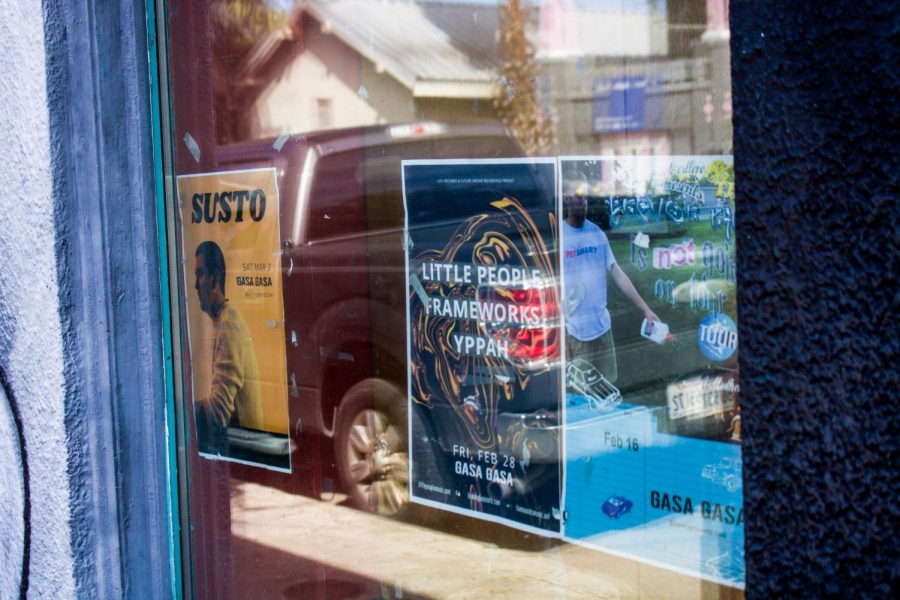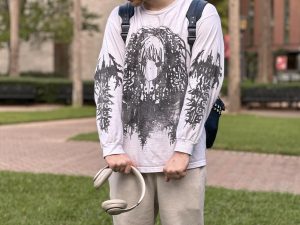New Orleans music venues struggle and endure during COVID-19
Posters advertising February concerts are still in the window of Gasa Gasa. The venue closed and is now for sale because of COVID-19.
September 25, 2020
The mecca of jazz music has felt the impact of the hit that the COVID-19 pandemic has taken on the music industry, which has shifted the landscape in live performance. With the closing of Gasa Gasa and tough times for Tipitina’s, the live music industry is struggling to pull through with no revenue and no permission to gather in front of a live audience.
Gasa Gasa on Freret Street, popular music venue and regular go-to for Loyola students, was forced to close because of restrictions placed on live indoor music. As a result of the closure, the venue is up for sale.
Music Industry senior Kate Schultz, a music manager and former member of the Gasa Gasa team, experienced first-hand the impact of the pandemic on the music industry. She left her position at Gasa Gasa in January and started a job as festival assistant with Winter Circle Productions, which got cut short as a result of the pandemic.
“By the time we knew COVID was present in New Orleans, I was no longer working at the venue,” Schultz said.
The band Schultz manages, Doctors, also had to cancel a show at Gasa Gasa in late March.
“The state and the mayor began imposing restrictions, but even without those restrictions, it was obvious it would just be irresponsible to the public health to continue having shows,” Schultz said. “Gasa is a small venue, so even with a limited capacity, maintaining social distancing there would be difficult.”
Tipitina’s, a famous local music club, has had to adjust to depend solely on secondary sources of income. General Manager Brian Greenberg gave insight on how lockdown and law bans on indoor live music has effected the venue, saying the situation is “pretty terrible, overall.”
“It’s never been closed like this, but there’s some light at the end of the rainbow; just a hard sight because we’re very questionable on a lot of things,” Greenberg said. “Mostly, we can’t put on live entertainment which is what we’ve been doing for over 40 years. We can’t have people in the building or on-stage, performing in front of people. This industry depends on large groups of people coming and enjoying live entertainment, and that’s completely untenable right now until we can put on a show with fewer restrictions.”
Greenberg said the heavy expense of owning a live music venue unable to host shows has taken its toll.
“Measures have been taken include amplifying our reach online and our merchandise sale that’s usually one of our secondary income,” Greenberg said. “People love us, people support us and we’ve got a great history and record. We’re very lucky that a lot of people are just wearing a Tipitina’s shirt around town. People post pictures on social media wearing Tipitina’s shirts and hats in different parts of the world. Something else we’ve been doing is livestreaming. Tipitina’s T.V., the livestream show, has been released online,” he said. A second season is now in the making.
“The music industry has definitely changed,” Greenberg added. “We’ve never thought we’d see an end to social gatherings, and I don’t know anyone that predicted this would be this harsh.”
The pandemic has turned the tide in industries across the world, and the performance aspect of the music world cannot survive without an audience. “Independent venues are the ones that are really at risk here. Venues such as your House of Blues or Fillmore’s have are obviously facing issues too with having to shut down, but they are owned by giant corporations that will (likely) receive benefits and will be able to recover,” Schultz followed.
For example, Live Nation reported that their revenue dropped by 98% last quarter (a total of a $87 million dollar loss). Prior to this, its revenue was $1.43 billion, which means it had $2 billion left in liquidity which has allowed for the company’s survival. Without constant shows and operation, most independent live music venues cannot afford this privilege.
According to Schultz, the ban on live shows and large gatherings were the first to take place with lockdown, venues were the first to shut down and will be the last to open. She said her estimates predict that about 90% of independent music venues will shut down if there is no aid from federal funding.
“There are many in New Orleans that have already shut down, Gasa Gasa and Techno Club being two staples of New Orleans live music that have already experienced this,” Schultz said.
“Indie venues are the backbone of the music industry,” said Schultz. “What needs to happen is for the government to begin providing federal funding to independent music venues. There are a number of acts that have been introduced that would do just this: The Save Our Stages Act and The RESTART Act.”
Students and musicians of the Loyola Community have lost a venue to the pandemic. “The selling of Gasa Gasa is particularly devastating to Loyola students who have worked and played there over the years,” said Schultz. “Loyola and Gasa have always had a special connection.”
Schultz said that federal and state support for the arts through acts such as Save Our Stages and RESTART can help revive the industry. “Obviously, a lot of damage has been done to the live music industry, but if the government acts now, we could preserve culturally significant independent venues and help the economy.”








